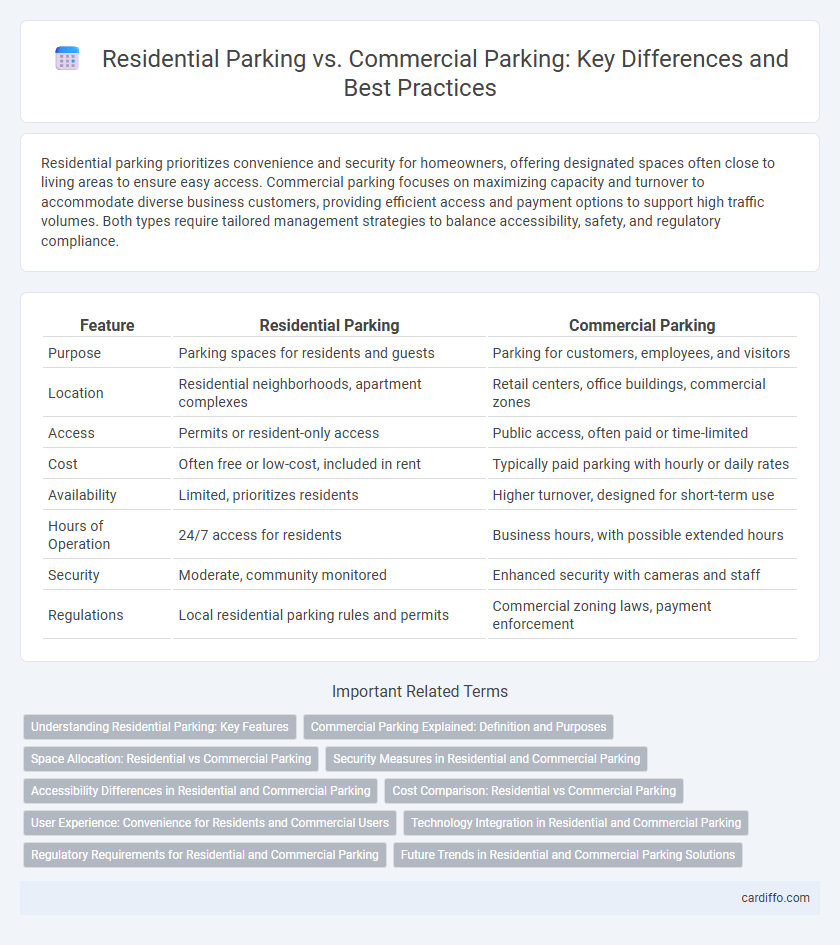Residential parking prioritizes convenience and security for homeowners, offering designated spaces often close to living areas to ensure easy access. Commercial parking focuses on maximizing capacity and turnover to accommodate diverse business customers, providing efficient access and payment options to support high traffic volumes. Both types require tailored management strategies to balance accessibility, safety, and regulatory compliance.
Table of Comparison
| Feature | Residential Parking | Commercial Parking |
|---|---|---|
| Purpose | Parking spaces for residents and guests | Parking for customers, employees, and visitors |
| Location | Residential neighborhoods, apartment complexes | Retail centers, office buildings, commercial zones |
| Access | Permits or resident-only access | Public access, often paid or time-limited |
| Cost | Often free or low-cost, included in rent | Typically paid parking with hourly or daily rates |
| Availability | Limited, prioritizes residents | Higher turnover, designed for short-term use |
| Hours of Operation | 24/7 access for residents | Business hours, with possible extended hours |
| Security | Moderate, community monitored | Enhanced security with cameras and staff |
| Regulations | Local residential parking rules and permits | Commercial zoning laws, payment enforcement |
Understanding Residential Parking: Key Features
Residential parking primarily serves the residents of a specific area, offering designated spaces close to homes with controlled access to ensure availability and security. Key features include permit systems, time restrictions tailored to neighborhood needs, and limited public access to reduce congestion and enhance convenience. These elements collectively help maintain order and prioritize parking for local residents over short-term visitors or commercial activities.
Commercial Parking Explained: Definition and Purposes
Commercial parking refers to parking facilities designed primarily for business use, accommodating customers, employees, and delivery vehicles. These parking areas are strategically located near offices, retail stores, and service centers to enhance accessibility and support commercial activities. Efficient commercial parking management improves traffic flow, maximizes space utilization, and contributes to the economic vitality of urban areas.
Space Allocation: Residential vs Commercial Parking
Residential parking prioritizes designated, smaller spaces tailored for long-term vehicle storage, often incorporating garages or driveways to accommodate private use. Commercial parking spaces are generally larger and designed to maximize turnover, with features such as clearly marked spots, payment systems, and accessibility to support high traffic volumes from employees and customers. Efficient space allocation in commercial settings optimizes revenue and accessibility, while residential parking emphasizes convenience and security for residents.
Security Measures in Residential and Commercial Parking
Residential parking prioritizes controlled access, surveillance cameras, and adequate lighting to ensure occupant safety and prevent unauthorized entry. Commercial parking facilities often implement advanced security measures such as 24/7 security personnel, automated gate systems, and integrated alarm systems to protect high vehicle turnover and valuable assets. Both types emphasize security but differ in scale and technology based on user density and risk factors.
Accessibility Differences in Residential and Commercial Parking
Residential parking typically offers limited spaces with controlled access to ensure availability for residents, often featuring permits or assigned spots that prioritize convenience and security. Commercial parking prioritizes high turnover and capacity, providing easily accessible, well-marked spaces designed to accommodate a larger volume of short-term users, including designated handicap spots and proximity to business entrances. Accessibility in commercial lots is enhanced by features such as ramps, wider aisles, and clear signage to facilitate quick, efficient parking for diverse users.
Cost Comparison: Residential vs Commercial Parking
Residential parking typically incurs lower costs due to fewer security measures and less demand compared to commercial parking spaces, which often require advanced surveillance and higher maintenance expenses. Commercial parking fees are usually higher because of prime locations, increased turnover rates, and the need for efficient space management. In many urban areas, monthly residential parking permits range from $50 to $150, while commercial parking can exceed $300 per month, reflecting the cost disparity driven by usage intensity and service levels.
User Experience: Convenience for Residents and Commercial Users
Residential parking prioritizes ease of access and proximity, offering designated spaces close to homes to enhance convenience for residents and reduce time spent searching for spots. Commercial parking emphasizes high turnover and availability to support business activities, often integrating features like short-term metering and proximity to commercial entrances to facilitate quick access for shoppers and employees. Optimizing user experience in both contexts involves balancing availability with security, signage, and payment options tailored to the distinct needs of residents versus commercial users.
Technology Integration in Residential and Commercial Parking
Residential parking increasingly incorporates smart access control systems and license plate recognition to enhance security and convenience for residents. Commercial parking utilizes advanced IoT sensors and dynamic pricing algorithms to optimize space utilization and improve revenue management. Both sectors benefit from integrated mobile app solutions that facilitate seamless entry, payment, and real-time availability updates.
Regulatory Requirements for Residential and Commercial Parking
Residential parking regulations often mandate permit systems, time restrictions, and designated zones to prioritize local residents and reduce street congestion. Commercial parking requirements typically include compliance with ADA standards, minimum parking space ratios based on building size, and adherence to fire safety and loading zone regulations. Both types must align with municipal zoning laws, but commercial parking faces stricter enforcement due to higher traffic volume and business activity.
Future Trends in Residential and Commercial Parking Solutions
Future trends in residential and commercial parking solutions emphasize the integration of smart technologies such as AI-powered space detection, automated payment systems, and electric vehicle charging stations. Urban planners are increasingly adopting mixed-use developments that blend residential and commercial parking to optimize space efficiency and reduce congestion. Sustainable materials and green infrastructure, including permeable pavements and solar-powered lighting, are transforming parking facilities into eco-friendly environments supporting climate goals.
Residential Parking vs Commercial Parking Infographic

 cardiffo.com
cardiffo.com